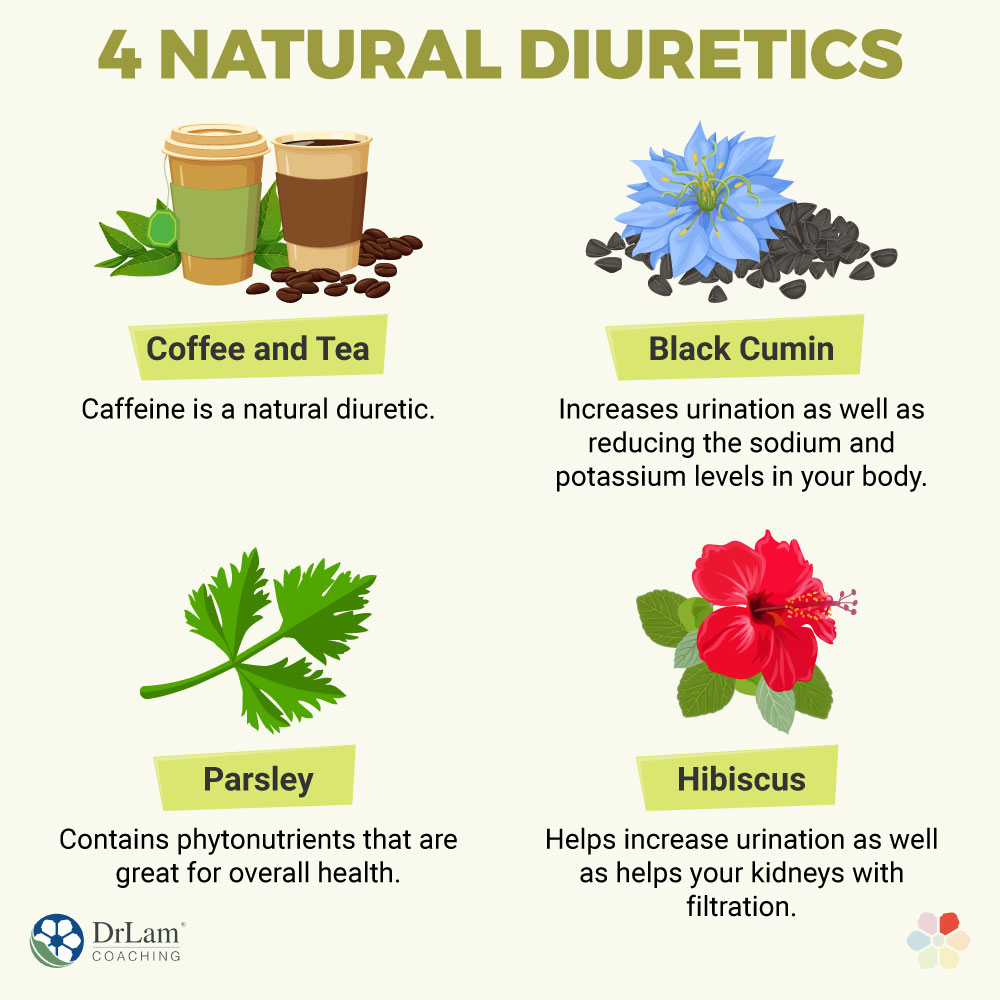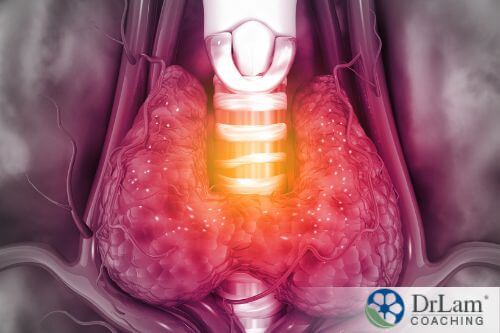Certain conditions can cause your body to retain extra water. This commonly leads to swelling. But it can also lead to more serious issues, such as breathing difficulties or blood pressure problems. In this article, we’ll take a look at these conditions as well as some natural diuretics that can help your body get rid of the excess fluid.
In general, the mainstream medical community tends to rely more on medications than foods and supplements when treating fluid retention. But before you turn to conventional diuretics, there are two things to consider here.
The first is that fluid retention is a symptom of something. It’s not a cause or condition in its own right.
The second is that many of these medications have side effects. Prescription diuretics can cause fatigue, headaches, skin rashes, muscle cramps, and dizziness. They usually reduce your blood pressure while helping to get rid of excess water. In some conditions, that may be the right thing to do. In others, though, it may be quite a problem.
For our adrenal fatigue clients, who tend to have low blood pressure, we don’t recommend these types of medications unless truly needed. We prefer looking for natural solutions if there’s swelling and water retention.

 Coffee and tea both contain caffeine, which is a natural diuretic. However, many people rely on coffee too much rather than on healthier ways of increasing energy and alertness. In our recovery programs, we try to wean clients off of too much coffee. Tea is a better option, as it has more antioxidants and also theophylline, which is a compound that increases its diuretic effects.
Coffee and tea both contain caffeine, which is a natural diuretic. However, many people rely on coffee too much rather than on healthier ways of increasing energy and alertness. In our recovery programs, we try to wean clients off of too much coffee. Tea is a better option, as it has more antioxidants and also theophylline, which is a compound that increases its diuretic effects.
Also known as nigella sativa, this is one of the better understood natural diuretics, and it seems to be just as effective as the prescription ones. It increases urination as well as reducing the sodium and potassium levels in your body.
This is another natural diuretic being closely studied. It seems to be quite effective as well. And, as an added bonus, it contains phytonutrients that are great for overall health.
This flower is usually used to make tea, which can be taken cold or warm. It’s a well-known blood pressure home remedy in many traditional cultures. More recently, a few studies corroborated that effect, showing that it helps increase urination as well as helps your kidneys with filtration.
Aside from the above, ginger, dandelion, horsetail, hawthorn, and juniper have also been listed as possible natural diuretics, although with less research backing them up. Many can be found in supplement form as well.
There are also some diuretic foods you can try, such as garlic, onions, watermelon, celery, berries, and grapes.
The following may increase fluid in your body:
As you can see, some of the above are temporary and not serious, while others can be chronic and serious conditions. And in the more serious cases, using natural diuretics needs to be done with a lot of care and supervision, as it could cause even more imbalance in your electrolytes and hormones.
 Your body is made up of around 50-65% water. The movement of this water in your body via osmosis is regulated by the minerals and electrolytes in your system.
Your body is made up of around 50-65% water. The movement of this water in your body via osmosis is regulated by the minerals and electrolytes in your system.
The balance in those electrolytes is what leads to a fluid balance. If you’re healthy, temporary imbalances are dealt with via natural physiological functions. For example, dehydration will cause your brain to send a signal of thirst, leading you to drink more. When your body contains too much liquid, then your kidneys will increase their fluid excretion.
There are a few key hormones involved in the balance of your body’s fluids. Namely, antidiuretic hormone (ADH), aldosterone, and cortisol.
ADH is also sometimes called arginine vasopressin. The pituitary gland in your brain makes it. Its main function is to promote the reabsorption of water by your kidneys.
Aldosterone and cortisol are both made by your adrenal glands. Aldosterone helps maintain a balance in your body’s fluids and minerals. The main minerals that affect your body’s fluid content are the electrolytes sodium and potassium. They need to also be in balance for your fluid levels to be optimal.
Aldosterone tells your kidneys to hold onto more sodium, and so they will also retain water. And the more your adrenals secrete aldosterone, the more your kidneys will hold onto sodium and water. The water then increases blood volume, and, by default, blood pressure.
High blood pressure means there’s too much blood volume, and too much water. Your adrenals will react by secreting less aldosterone in order to allow your kidneys to let go of the sodium and excess water. On the other hand, if your blood pressure is low, that will prompt your adrenals to secrete more aldosterone to make your kidneys retain sodium and therefore more water.
But, if you have too much aldosterone due to an adrenal issue, you may need a natural diuretic to help your kidneys flush out the sodium and excess water.
Cortisol is your body’s main anti-stress hormone. But it can also affect aldosterone and water retention.
With cortisol, the main culprit in its dysregulation is chronic stress. Chronic stress causes your adrenals to overwork. At first, they are able to produce more and more cortisol to deal with that stress. They also produce more aldosterone. After a while, they become exhausted, and their cortisol and aldosterone levels drop.
Symptoms of AFS include fatigue, weight gain, brain fog, anxiety, mild depression, sleep problems, loss of libido, PMS, infertility, lowered immunity, food and drug sensitivities, hypoglycemia, salt and sugar cravings, and unstable blood pressure, to name a few.
When we’re designing an adrenal fatigue recovery plan for a client, we take into consideration their electrolyte and hormone balance. For example, if you’re in the earlier stages of AFS, we may use natural diuretics to help you flush some water out. But if you’re in more advanced stages, we actually avoid diuretics so that you retain more sodium and fluid and don’t get low blood pressure.
 Your Bioenergetics Circuit is part of your body’s NeuroEndoMetabolic (NEM) Stress Response. The NEM is a network of organs and systems that work together to fight stress, arranged in six circuits. And your Bioenergetic Circuit specializes in how your metabolism adapts to stressors. It is composed of your pancreas, thyroid, and liver. The first two are very much affected by hormone imbalances, since they are also hormone-producing organs.
Your Bioenergetics Circuit is part of your body’s NeuroEndoMetabolic (NEM) Stress Response. The NEM is a network of organs and systems that work together to fight stress, arranged in six circuits. And your Bioenergetic Circuit specializes in how your metabolism adapts to stressors. It is composed of your pancreas, thyroid, and liver. The first two are very much affected by hormone imbalances, since they are also hormone-producing organs.
That’s why you see hypoglycemia in AFS, thanks to the pancreas, as well as fatigue, hair loss, and other hypothyroid symptoms. Your liver is also affected by water flow, since it is your body’s main detoxification organ. If your kidneys aren’t filtering things out properly, then you may end up with some congestion, and your liver will get overworked.
Natural diuretics may be useful for your Bioenergetics Circuit by helping your fluid balance. Fluid balance, along with the right diet and exercise program, can then balance out your electrolytes, which can then support your hormones as well. Getting the right fluid balance will also support your kidneys and liver in their detoxification efforts. All this leads to more energy, better metabolism, and fewer blockages in your system.
Natural diuretics are herbs, foods, and supplements that can help your body get rid of excess water. This may be useful in certain conditions, especially in place of prescription diuretics, as those can have undesirable side effects. Some of the best supported by research are tea, black cumin, parsley, and hibiscus.
Those with AFS and Bioenergetics Circuit dysregulation may find them helpful. But even though they are natural compounds, you still need to use them with caution and with the help of your doctor. Misused, diuretics could also unintentionally worsen electrolyte and hormone imbalances.
If you’d like to know more about our natural approach and nutritional programs, please call us for a free initial consultation with one of our coaches.
Natural diuretics are foods, herbs, and supplements that help your body get rid of excess water. That can then help your electrolytes and hormones find balance again, giving you more energy and better detoxification. But they need to be used with caution, especially if you have certain conditions.
